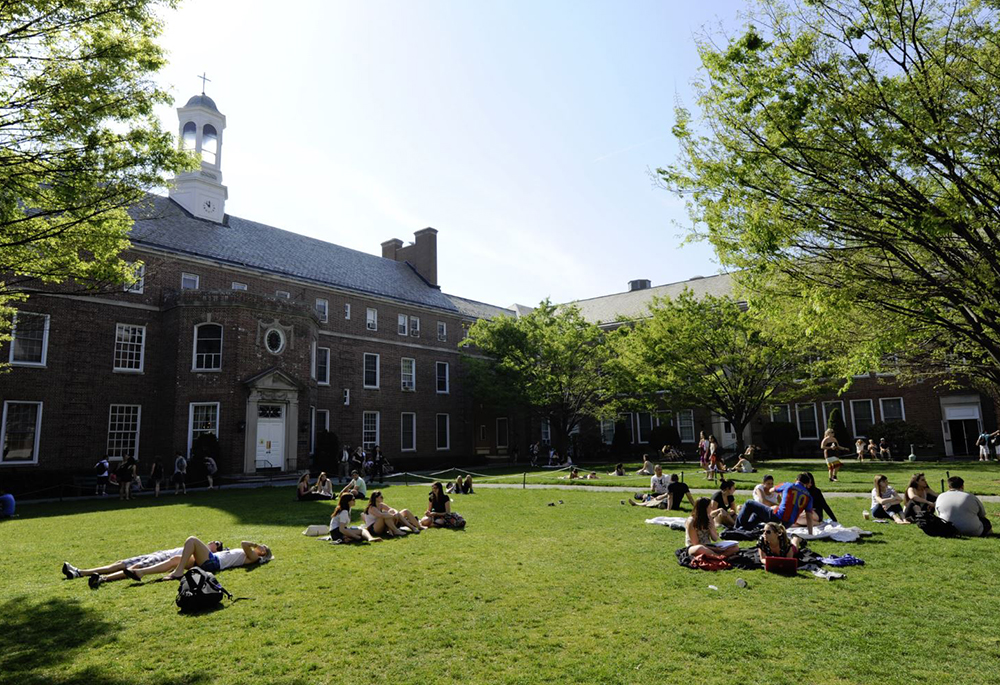
Students are pictured at Manhattan College in the Bronx, in a 2014 photo. (Wikimedia Commons/Trollness, CC BY-SA 4.0 deed)
Citing declining enrollment and structural deficits, the new administration at one of New York City's longest-running Catholic colleges has moved this year to eliminate several academic programs and slash faculty positions. More than 25% of faculty have been terminated over the past seven months, according to the student newspaper.
Among the programs that stand to be eliminated by Manhattan College, located in the Bronx and first established by the De La Salle Christian Brothers in 1853, is the institution's religious studies major.
Catholic higher educational institutions in the Northeast and other regions are dealing with similar demographic and fiscal challenges, but the manner in which the Manhattan College administration has gone about implementing the board of trustees' directive to "rightsize" the college has alienated a large swath of students, alumni and professors.
"The administration doesn't want to discuss the situation as equals. When the faculty asks questions, they seem to respond with threats," Adam Arenson, a Manhattan College history professor, told NCR.
Frustrations boiled over in late January as faculty members approved a no-confidence vote in Manhattan College President Milo Riverso, a longtime business leader in the construction industry who assumed his leadership post in July 2023. Faculty leaders notified the college's board of trustees chairperson and vice-chairpersons of the no-confidence vote in a Jan. 29 email obtained by NCR.
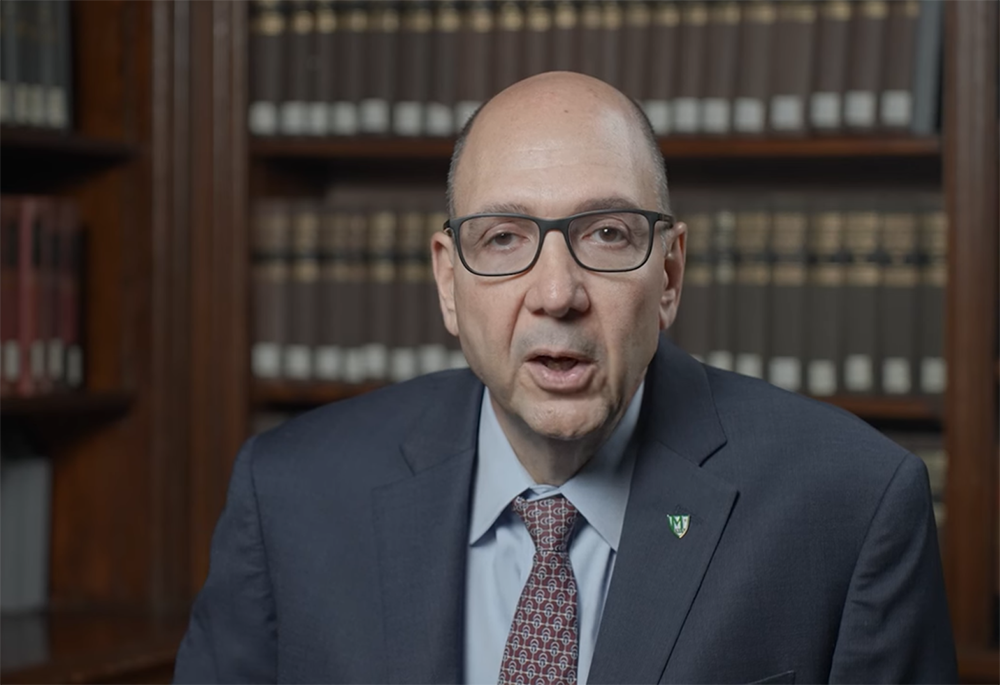
Milo Riverso, president of Manhattan College, is pictured in a screengrab from his introductory video message, posted on the college's YouTube channel. (YouTube/manhattancollege)
"President Riverso's management style has cultivated an atmosphere of uncertainty, distrust, and fear among faculty, staff, and students," faculty leaders wrote in their email in which they reported that 89% of 147 participating professors voted to express no confidence in Riverso.
Critics say Riverso and his leadership team have acted unilaterally without consulting faculty leaders and curriculum committees while disregarding contractual obligations pertaining to tenured professors. They also accuse the administration of employing high-handed tactics and not being honest or forthcoming with information about the college's finances.
"All [the administration is] basically saying is that they're running a deficit, so they need to fire faculty," said Mike Judge, a biology professor who will leave Manhattan College in December after teaching 31 years there.
By this summer, 62 faculty positions at Manhattan College will have been eliminated through layoffs and buyouts, according to The Quadrangle, the student newspaper. Twenty majors and minors, most of them in liberal arts programs like religious studies and philosophy, will no longer be offered.
"If we really do have financial issues, faculty should be playing a role in the elimination of programs, but [the administration doesn't] want to hear that at all. They just want to eliminate programs," said Judge, one of 23 professors who during the Fall 2023 semester accepted the administration's "voluntary separation agreement."
Spokespersons for Manhattan College did not return several messages from NCR seeking comment for this story.
On Feb. 2, Stephen Squeri, chairman of the Manhattan College board of trustees, defended Riverso and his decisions in a letter he sent on the board to leaders of the Council for Faculty Affairs and Faculty Welfare Committee at Manhattan College. Squeri wrote that the board "respectfully disagrees" with the reasoning behind the no-confidence vote. He added that the board "unanimously stands'' by Riverso's decisions and his plan to "ensure the long-term financial stability of the College and its ability to pursue its mission for generations of students to come."
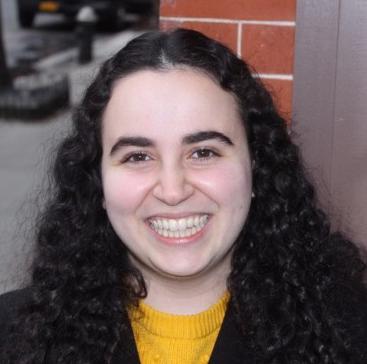
Teresa Ramoni (Courtesy of Teresa Ramoni)
"We understand that not everyone will agree with the outcome, but we believe that the steps the administration has taken were appropriate and necessary," Squeri wrote in his letter, a copy of which was obtained by NCR.
Among those who disagree are the more than 2,900 current Manhattan College students, alumni and others who have signed an online petition objecting to the administration's plan to eliminate tenured faculty positions. The petition's organizer, Teresa Ramoni, accused the administration of betraying the college's Lasallian values, especially those pertaining to providing a quality education and showing respect for all people.
"Everyone is aware of how damaging these decisions are, especially in light of broader cultural trends that are devaluing the liberal arts," said Ramoni, who graduated from Manhattan College in 2020 with an English degree and a minor in religious studies.
Meanwhile, a GoFundMe page has collected over $30,000 to pay for legal expenses for the faculty to "defend tenure rights at Manhattan College and to stop a dangerous precedent for the erosion of tenure across the country."
"We have lawyers now who are negotiating with [the administration] to see if they want to reach a settlement, but we want to keep our options open," said Arenson, who set up the GoFundMe page.
The no-confidence vote in Riverso followed months of turmoil, covered by local media outlets and The Quadrangle, where students and alumni held protests on campus, and faculty members petitioned administrators for answers they said were not provided.
"The administration claims there are deficits, but they haven't provided enough information for faculty or other members of the campus community to make their own alternative suggestions," Arenson told NCR.
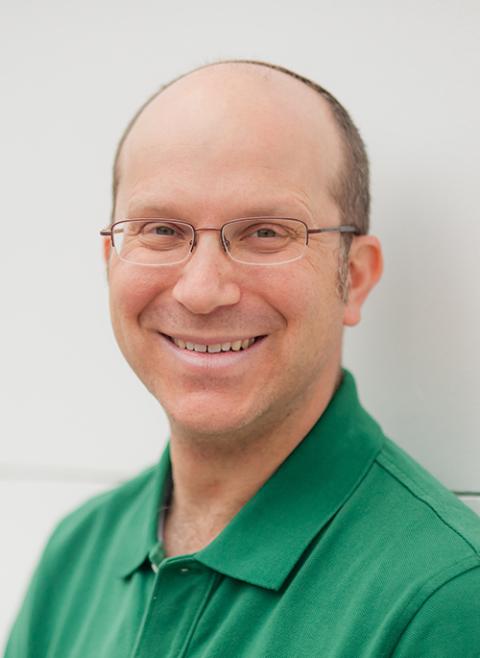
Adam Arenson, a Manhattan College history professor (Courtesy of Adam Arenson)
Witnessing the pending elimination of liberal arts majors like religious studies prompted some faculty members and alumni to say they are concerned with the Catholic college's current direction.
They noted that the renowned Catholic theologian St. Joseph Sr. Elizabeth Johnson earned her master's degree in theology from Manhattan College. Judith Plaskow, a pioneering Jewish feminist theologian, taught religious studies at Manhattan College for more than 30 years. The National Honor Society for Religious Studies and Theology began at Manhattan College in 1976.
"I don't think [Riverso] understands how academia works," said Ramoni, who is now pursuing a master's degree in English at Rutgers University.
Riverso, an alumnus of Manhattan College who previously served on its board of trustees and taught as an adjunct professor in the civil engineering graduate program, offered a window into his thinking in a Dec 18 letter he wrote to students and parents regarding the structural changes at the college.
Employing language from his business background, Riverso said the administration had used a "highly data-driven" approach that he said uncovered "certain structural imbalances" and diminishing returns in programs where the college had been "focusing resources." He said some classes and major programs only enrolled a handful of students.
"We were also trailing comparable benchmarks in terms of efficiency of our faculty and classes offered," Riverso wrote.
Advertisement
In his letter responding to the faculty's no-confidence vote, Squeri said the college's board of trustees "specifically chose" to elect Riverso as president due to "his unique skillset, long-term vision for the College, and his ability to help Manhattan College address the challenges we and other similar institutions continue to face as a result of the effects of the pandemic."
"Dr. Riverso's plan, which was presented to and endorsed by the Board, includes a number of difficult but necessary steps to put the College on solid financial footing and focus our resources on the areas that are delivering the greatest value for our students and the entire College community both now and in the future," Squeri wrote.
In his Dec. 18 letter, Riverso said his administration would look to provide opportunities in 2024 for "an open and ongoing dialogue" around those changes. But faculty members told NCR that Riverso's promise of dialogue has not materialized.
In a Jan. 16 campus-wide email, Riverso said the administration had made "the difficult decision to eliminate a limited number of faculty and staff positions" in part to "better align" the college's resources.
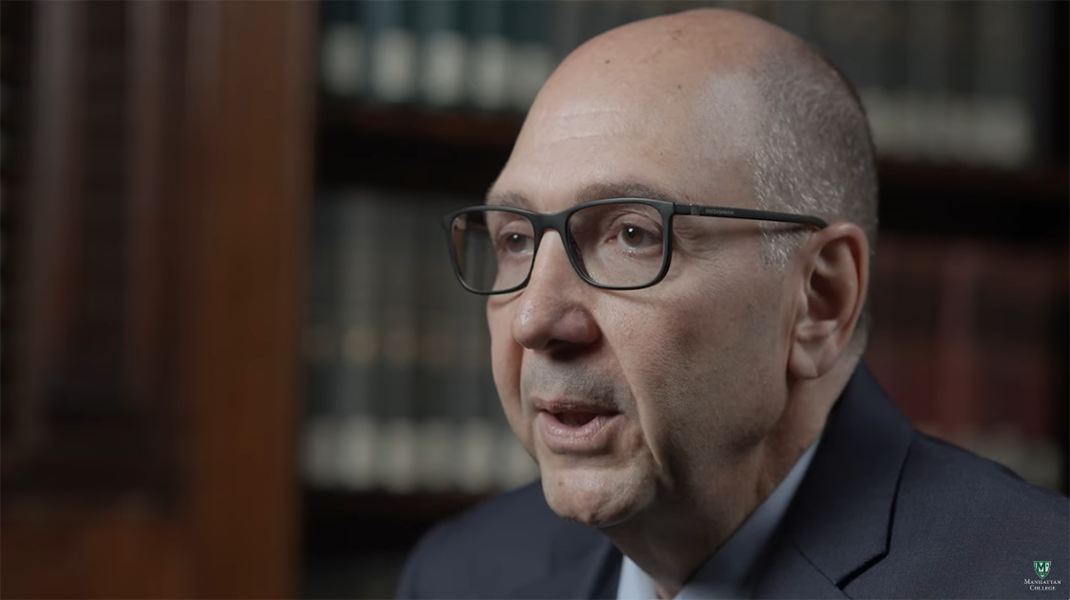
Milo Riverso, president of Manhattan College, pictured in a screengrab from a video message on the college's YouTube channel. (YouTube/manhattancollege)
Also in January, the administration moved forward with plans to consolidate the college's six schools into three, a process that led to the business and engineering schools being preserved but the schools of liberal arts, science, health professions and continuing and professional studies being merged into a single school.
"It seems like every week [the administration is] throwing something new at the faculty," said Ramoni, who said she is in frequent communication with and receives regular updates from her former professors at Manhattan College.
In an Oct. 17 email to faculty leaders, obtained by NCR, Riverso also mentioned the need to eliminate programs, consolidate schools, and reduce low-enrolled courses while increasing average class sizes to 25 across all departments. He solicited feedback and recommendations from faculty leaders, but said their input would "need to lead to a reduction in instructional costs and faculty lines."
Squeri, the board of trustees' chairman, wrote in his Feb. 2 letter that Riverso's plan is "the culmination of directives" that the board gave to Riverso and his predecessor over the last two years to address "systemic finances that have detrimentally affected Manhattan College."
Judge, who turns 65 this year, said he accepted the voluntary separation agreement because he thought he would be helping to save another faculty member's job by doing so. But given recent events, Judge said he is no longer sure his decision will have that effect.
Said Judge, "If you don't have faculty who want to be there, who feel comfortable and don't have to look over their shoulder wondering if they're going to lose their job next time, then you're losing the type of faculty you want to have around engaging students. It's penny-wise and pound-foolish."






